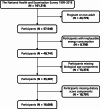Associations of healthy eating patterns with biological aging: national health and nutrition examination survey (NHANES) 1999-2018
- PMID: 39342289
- PMCID: PMC11439248
- DOI: 10.1186/s12937-024-01017-0
Associations of healthy eating patterns with biological aging: national health and nutrition examination survey (NHANES) 1999-2018
Abstract
Background: Healthy dietary patterns have been negatively associated with methylation-based measures of biological age, yet previous investigations have been unable to establish the relationship between them and biological aging assessed through blood chemistry-based clinical biomarkers. We sought to assess the associations of 4 dietary metrics with 4 measures of biological age.
Methods: Among 16,666 participants in NHANES 1999-2018, 4 dietary metrics [Dietary inflammatory index (DII), Dietary approaches to stop hypertension index (DASH), Alternate mediterranean diet score (aMED), and Healthy eating index-2015 (HEI-2015)] were calculated through the 'dietaryindex' R package. Twelve blood chemistry parameters were utilized to compute 4 indicators of biological age [homeostatic dysregulation (HD), allostatic load (AL), Klemera-Doubal method (KDM), and phenotypic age (PA)]. Binomial logistic regression models and restricted cubic spline (RCS) regression were employed to evaluate the associations.
Results: All 4 dietary metrics were significantly associated with biological age acceleration or deceleration. In comparison to the lowest DII, the odds ratios (ORs) for accelerated HD, AL, KDM, and PA were 1.25 (1.08,1.45), 1.29 (1.11,1.50), 1.34 (1.08,1.65), and 1.61 (1.39,1.87) for the highest. The multivariable-adjusted ORs of the highest quartile of DASH, aMED, and HEI-2015 were 0.85 (0.73,0.97), 0.88 (0.74,1.04), and 0.84 (0.74,0.96) for HD, 0.64 (0.54,0.75), 0.61 (0.52,0.72), and 0.70 (0.59,0.82) for AL, 0.68 (0.54,0.85), 0.62 (0.50,0.76), and 0.71 (0.58,0.87) for KDM, and 0.50 (0.42,0.59), 0.64 (0.54,0.76), and 0.51 (0.44,0.58) for PA when compared with the lowest level. The findings were validated by the best-fitting dose-response curves for the associations. Among participants consuming dietary supplements (Pinteraction < 0.05), the positive effects of a healthy dietary pattern on biological aging were more pronounced. Systemic immune inflammation index (SII) and atherogenic index of plasma (AIP) were identified as being involved in and mediating the associations.
Conclusions: Biological aging assessed through blood chemistry-based clinical biomarkers is negatively associated with diet quality. The anti-aging benefits of improving the diet may be due to its ability to reduce inflammation and lower blood lipids.
Keywords: Biological age; Biological aging; Dietary metrics; Healthy eating patterns; National Health and Nutrition Examination Survey (NHANES).
© 2024. The Author(s).
Conflict of interest statement
The authors declare no competing interests.
Figures




References
-
- Park YM, Steck SE, Fung TT, Zhang J, Hazlett LJ, Han K, et al. Mediterranean diet, Dietary approaches to stop hypertension (DASH) style diet, and metabolic health in U.S. adults. Clinical nutrition (Edinburgh. Scotland). 2017;36(5):1301–9. - PubMed
-
- Park LK, Friso S, Choi SW. Nutritional influences on epigenetics and age-related disease. The Proceedings of the Nutrition Society. 2012;71(1):75–83. - PubMed
MeSH terms
Substances
Grants and funding
LinkOut - more resources
Full Text Sources
Medical
Miscellaneous

